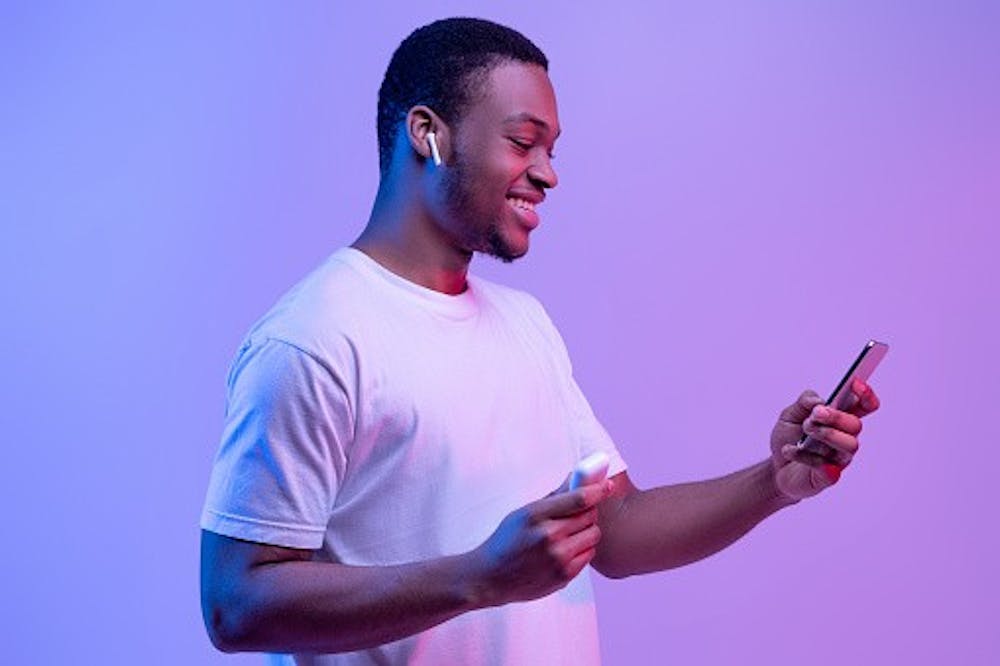As human beings, we have been given only five senses: touch, taste, smell, sight and hearing. And while all five are crucial, it’s sight and hearing that help us connect the most with those around us on a day-to-day basis. We see a friendly face at the Hodson Dining Commons or hear a friend’s voice chattering away while waiting for his or her coffee at the Jumping Bean. Even passing by an individual on campus we don’t recognize, a simple “hey” or smile can go a long way in terms of lifting a person’s spirits.
Yet it’s easy to miss those audible and visual messages when one is glued to a smartphone or spellbound by Taylor Swift’s latest album thanks to a pair of shiny white AirPods — “Midnights” is expected to arrive toward the end of October. How many pairs of headphones or AirPods will that be playing in? Maybe a better way to phrase the question is: how many simple greetings or smiles will it sabotage?
Over the summer, a member of the editorial board went to lunch with their family at LongHorn Steakhouse. Not far away, at one of the booths lining the wall, a grandfather and his grandchild were sharing a meal, if that’s what you’d like to call it. The boy was looking down at his phone, with a white AirPod snug in each ear. Not only was he not interested in looking at his grandpa; he didn’t even want to hear him.
A lot of these white AirPods are floating around campus: at the gym, in the bathroom, and, yes, even occasionally inside a classroom. Since debuting in 2016, AirPods have become one of Apple’s most popular products. A “Bloomberg” article released on Sept. 22 reports that “outside analysts say (Apple) sold 120 million or so pairs in 2021.”
Of course, the AirPods are useless if not connected to an iPhone, another Apple device that demands our constant attention thanks to its myriad of buzzes and pings.
Freshman Michael Hoover strives to pocket his device when moving about campus.
“I’m generally looking around at people, trying to see if I know anybody walking by,” Hoover said.
The university places a great deal of emphasis on students forging lasting relationships with one another, the hope being the majority of the student body walks away from Upland with a support group that can cheer during the highs and wipe away tears during the lows. But those relationships start (usually) with a small connection, and that connection can be easily missed if one is more content being in right relationship with his or her Apple devices than being in right relationship with others.
Unfortunately, forming a close friendship with another person most likely involves some initial discomfort. One of the reasons so many of us are happy to frequently check Twitter or pop in our AirPods is because both protect all of us from dreaded small talk.
Professor of communication Jeff Groeling prefers to avoid small talk if at all possible.
“When I have conversations, I want them to be meaningful,” he said.
In his online MasterClass, American humorist and best-selling author David Sedaris tells the story of a personal friend who praises his smart device for its ability to protect him from small talk and being forced to interact with others. For Sedaris, small talk is only as small as you make it.
“It’s exciting to think that you’re living in this world with all of these other people, and today is an opportunity for you to connect with some of them,” Sedaris says. “That’s what makes life worth living.”
So, the next time you’re in line waiting for a We Covenant at the Bean, think about leaving the AirPods in their case or the iPhone in your pocket. Try to connect with someone. Again, even brief eye contact paired with a simple smile can brighten someone’s day.
Start forging that next relationship. There is a time and place for mobile devices and all the gadgets — like AirPods — that accompany them. It’s just important to make sure the usage level isn’t greatly interfering with those brief moments we’re given every day to connect with somebody else.
And, remember, small talk doesn’t have to be small at all.





